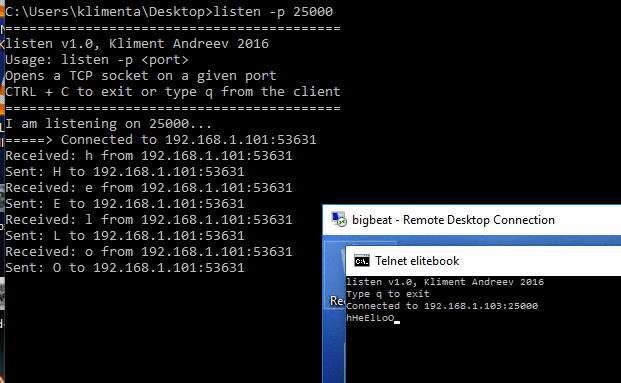I needed an utility that acts as a TCP server on a random port and if a client telnets to that port, the server will have to return something to that client. There are probably a tons of utilities like this, ranging from PowerShell scripts to nc (netcat), but I’ve decided to make one in Visual C# 2015 using .NET 3.5.
My utility is based on this MSDN article with slight modifications.
So, launch the utility with the port in mind, e.g. listen -p 25000 and the program will wait for someone to connect to that port. Once you do telnet
So, here is the source and link to github repo.
An image of listen in action.

using System;
using System.Net;
using System.Net.Sockets;
namespace listen
{
class Program
{
static void usage()
{
Console.WriteLine(new string('=', 42));
Console.WriteLine("listen v1.0, Kliment Andreev 2016");
Console.WriteLine("Usage: listen -p <port>");
Console.WriteLine("Opens a TCP socket on a given port");
Console.WriteLine("CTRL + C to exit or type q from the client");
Console.WriteLine(new string('=', 42));
}
static void Main(string[] args)
{
if ((args.Length == 0) || (args.Length != 2))
{
usage();
return;
}
if (args[0]!="-p")
{
Console.WriteLine("Unknown switch {0}", args[0]);
usage();
return;
}
int intTemp;
bool bisNumeric = int.TryParse(args[1], out intTemp);
if (!bisNumeric)
{
usage();
return;
}
TcpListener server = null;
try
{
// Set the TcpListener on port intTemp.
Int32 intPort = intTemp;
IPAddress localAddr = IPAddress.Parse("0.0.0.0");
// TcpListener server = new TcpListener(port);
server = new TcpListener(localAddr, intPort);
// Start listening for client requests.
server.Start();
// Buffer for reading data
Byte[] bytes = new Byte[4096];
String data = null;
// Enter the listening loop.
while (true)
{
usage();
Console.WriteLine("I am listening on {0}... ", intPort);
// Perform a blocking call to accept requests.
// You could also user server.AcceptSocket() here.
TcpClient client = server.AcceptTcpClient();
Console.WriteLine("=====> Connected to {0}", client.Client.RemoteEndPoint);
data = null;
// Get a stream object for reading and writing
NetworkStream stream = client.GetStream();
byte[] banner = System.Text.Encoding.ASCII.GetBytes(
"listen v1.0, Kliment Andreev 2016\r\nType q to exit\r\n"
+ "Connected to " + client.Client.LocalEndPoint + "\r\n");
stream.Write(banner, 0, banner.Length);
int intLoop;
// Loop to receive all the data sent by the client.
while ((intLoop = stream.Read(bytes, 0, bytes.Length)) != 0)
{
// Translate data bytes to a ASCII string.
data = System.Text.Encoding.ASCII.GetString(bytes, 0, intLoop);
Console.WriteLine("Received: {0} from {1}", data, client.Client.RemoteEndPoint);
// Process the data sent by the client.
data = data.ToUpper();
if (data == "Q") return;
byte[] msg = System.Text.Encoding.ASCII.GetBytes(data);
// Send back a response.
stream.Write(msg, 0, msg.Length);
Console.WriteLine("Sent: {0} to {1}", data, client.Client.RemoteEndPoint);
}
// Shutdown and end connection
client.Close();
}
}
catch (Exception e)
{
Console.WriteLine("SocketException: {0}", e);
}
finally
{
// Stop listening for new clients.
//server.Stop();
}
}
}
}

